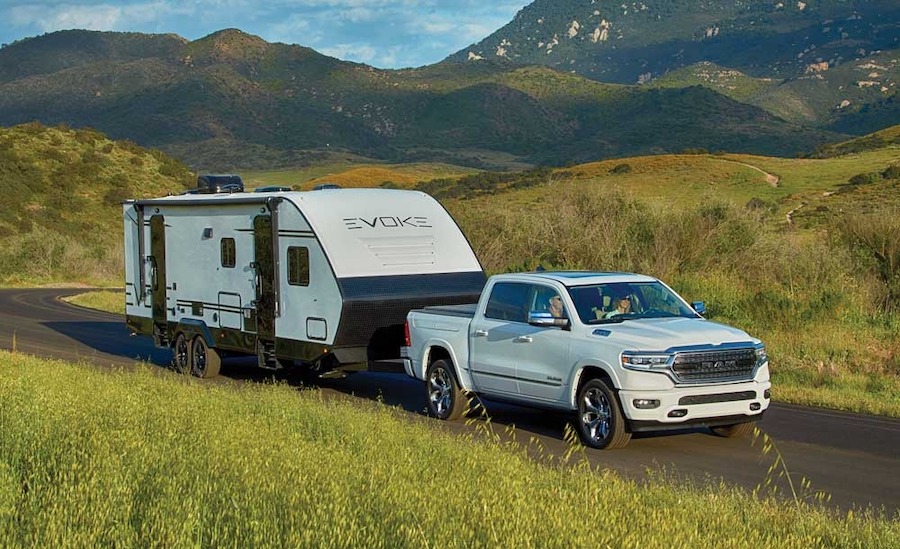Travel trailers have become a symbol of freedom and adventure for many, offering a luxurious way to travel along with the comforts of home. They’re growing in popularity as more and more people find convenient, cost-effective ways to explore the natural world and take extended vacations without the high cost of hotels and air travel and the dropping of travel vans greatly diversify in size, features and price, providing a variety of use passenger profiles.

Emphasizing the importance of this topic, this post aims to provide important insight into the factors that affect the longevity of travel trailers. For buyers, it’s about knowing what to look for to ensure a sustainable investment. Owners need to understand how to maintain and maintain their trailers for maximum survival and enjoyment. Whether you’re in the market for a new travel companion or looking to extend the life of your current trailer, this guide will give you the knowledge you need to navigate the world of travel trailers with confidence.
Understanding travel trailer life
Understanding the life cycle of a passenger vehicle is important for prospective and current buyers, as it affects decisions regarding purchasing, maintenance, and ultimately resale or refurbishment What you can expect in terms of longevity and how long your passenger car is roadworthy and comfortable here’s Let’s dive into what plays an important role in staying .

Average transportation lifetime
The average life expectancy of a well-maintained travel vehicle is between 10 and 15. However, with proper maintenance, some trailers can even exceed 20 years of service life. For a variety of reasons that can extend or shorten transport life. It is important for owners to realize that while some trailers may show immediate signs of wear and tear, proper maintenance can significantly extend their usable life.
Factors Influencing Longevity
Build Quality
The construction quality of a travel trailer is one of the most critical factors determining its lifespan. Trailers built with high-quality materials and robust construction techniques can withstand the rigors of the road and elements much better than those made with cost-cutting in mind. Brands known for their durability and high standards often command higher prices, but the investment can pay off in terms of longevity.
Usage Frequency
How often and how intensively a travel trailer is used also impacts its lifespan. Frequent travel, especially over rough terrain, can accelerate wear and tear on both the trailer’s interior and its structural components. Conversely, a trailer that is rarely used or mostly remains stationary may suffer from different issues, such as seals and gaskets drying out or pest infestations, if not properly maintained.
Maintenance
Regular maintenance is the linchpin of extending a travel trailer’s lifespan. This includes routine checks and repairs of the roof, windows, seals, and appliances, as well as attention to tires and undercarriage. Owners who adhere to a comprehensive maintenance schedule can prevent minor issues from escalating into major problems, thereby ensuring their trailer remains in good condition for longer.
Environmental Conditions
The environment where a trailer is used and stored can greatly affect its durability. Trailers exposed to harsh sun, heavy rain, snow, and salty air may experience quicker degradation of materials, such as fading paint, rusting metal parts, and sealant breakdown. Protective measures, such as using a trailer cover, regular cleaning, and storing the trailer in a covered area, can mitigate these effects and contribute to a longer lifespan.
How to Maximize Your Travel Trailer’s Lifespan
Maximizing the lifespan of your travel trailer not only enhances your travel experiences but also protects your investment. By adhering to a regular maintenance schedule, considering strategic upgrades, and utilizing professional inspections, you can ensure your trailer remains in prime condition for years to come. Here’s how to extend the longevity of your travel trailer:
Regular maintenance checks
Regular maintenance is necessary to prevent soil erosion from becoming a serious issue. Here’s a maintenance checklist to keep your travel trailer in top shape:
- Roof inspection and maintenance: Check for leaks or damage twice a year and after major trips. Clean the roof regularly and apply sealant to any cracks.
- Seal and Seam Check: Check all seals and seams annually for water damage. Re-cover areas that show signs of wear or leakage.
- Tire maintenance: Check tire pressure and check for wear and tear before each trip. Rotate and replace the tires as recommended by the manufacturer.
- Water System: Clean the water and check for leaks at least once a year.
- Equipment Check: Make sure all equipment is in good working order and safe. Regularly clean refrigerator vents, AC units, and furnace vents.
- Battery maintenance: Check battery life and clean connections. Make sure batteries are properly charged and stored, especially during off-season storage.
- Cleaning the exterior: Wash the exterior regularly and check for signs of wear and tear.
Improvements and changes that can increase sustainable development
Consider making modifications and modifications to address known weaknesses and extend the life of your travel trailer:
- Advanced suspension: Installing a high-quality suspension system can reduce damage to your travel trailer while traveling, especially on steep roads . . . .
- High-quality tires: Investing in high-quality tires can improve safety and reduce the chances of tire failure on long journeys.
- LED lighting: Switching to LED lighting reduces energy consumption and extends the life of your battery lighting system.
- Solar panels: Installing solar panels can reduce reliance on external energy sources and batteries, providing sustainable electricity.
- Protective layer: Apply a protective layer on the outside to protect against UV damage and the elements.
The role of management in preventive maintenance
While regular self-monitoring is important, employee surveys can capture information that might otherwise be overlooked:
- Annual Personnel Survey: Conduct an annual personnel survey of your travel trailer. Potential problems can be found in critical areas such as the electrical system, chassis, and brakes.
- Special inspections: If you suspect a specific issue or have made significant changes, special inspections can ensure that everything is installed on schedule and safely.
- Pre- and post-season inspections: A professional inspection before you embark on your first trip of the season and prepare for winter storage can help ensure that you the trailer is ready for the road or you will hibernate.
What to look for when buying a travel trailer
Knowing what to look for when venturing into the caravan world can save you time, money and headaches down the road. Focusing on longevity, asking the right questions, and understanding warranty coverage are important steps. Additionally, learning from the experiences of long-term owners can provide valuable insight. Here is a comprehensive guide to buying with knowledge and shared wisdom from experienced passenger car rentals.
What to look for when buying a travel trailer
Important determinants of longevity
- Quality construction: Look for trailers made of durable materials such as aluminum sheeting and high-quality exterior panels. Strong construction can withstand travel and harsh weather.
- Reputable manufacturer: Choose products that are known for their reliability and customer service. Research brand reviews and ratings to see their track record.
- Watertight: Check for windows, doors and ceilings that are properly repaired. Good water resistance is essential to prevent leakage and water damage.
- Floor Plan and Utility: Make sure the layout meets your needs without overburdening the structure. A functional floor plan that avoids unnecessary stress on the trailer’s frame can maximize longevity.
- Insulation: Adequate insulation is essential for the comfort and protection of contents, especially if you plan to use the trailer in extreme heat.
Questions to ask sellers or previous owners
- Maintenance history: Request a detailed record of past maintenance and repairs. This can tell you how well the trailer has been maintained.
- Usage information: Ask how the trailer is used, such as frequency, trips (short and long distances), and storage conditions.
- Previous issues: Ask about any issues or repairs, especially with roofing, plumbing and electrical systems.
- Warranty Delivery: When buying used, check to see if any existing warranties can be transferred to you as the new owner.
Understanding Warranties and What They Cover
- Comprehensive vs. Limited Warranties: Understand the scope of coverage. Comprehensive warranties cover most parts of the trailer, while limited warranties may exclude certain components.
- Duration of Coverage: Note how long the warranty lasts and what conditions may void it.
- Claim Process: Familiarize yourself with the process for filing a warranty claim, including any required documentation or pre-approval for repairs.
Real-World Insights: Owners Share Their Experiences
Anecdotes from Long-term Travel Trailer Owners
Many owners emphasize the importance of regular maintenance and the impact of usage patterns on their trailers’ longevity. For example, one owner shared how routine sealing and inspections prevented water damage, a common issue that can significantly shorten a trailer’s life.
Lessons Learned About Maintenance, Upgrades, and Travel Habits
- Preventive Maintenance: Consistently topping the list of recommendations, proactive upkeep can forestall many common problems.
- Thoughtful Upgrades: Upgrades like improved insulation, solar panels, and higher-quality tires were frequently mentioned as worthwhile investments for extending travel trailer life.
- Adaptation to Travel Needs: Owners advised considering how travel habits might evolve over time and choosing a trailer that can accommodate changing needs and destinations.
conclusion
In this article, we examined the various aspects that affect the life of a travel trailer, from the need for proper construction and regular maintenance to the impact of environmental conditions and operating systems That can be provided.
It is important for consumers to understand these factors when making a purchasing decision. Choosing a travel vehicle that’s built to last, and being involved in its ongoing maintenance, can lead to a more enjoyable and cost-effective experience
Lastly, remember that the fun of travel trailers comes from the experiences it enables you to have. By considering longevity as a key factor in your purchasing and maintenance decisions, you want to ensure that those experiences can last as long as possible. Here are many years of adventures on the freeway, with your travel trailer as your trusted companion.







Leave a Reply